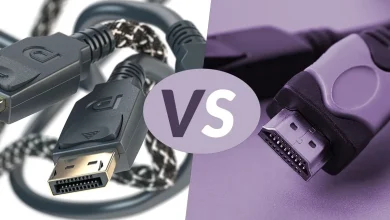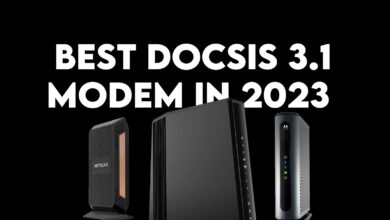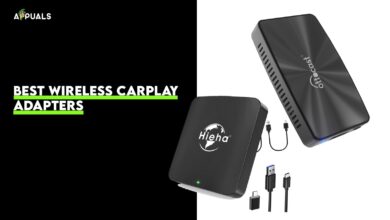7 Best WiFi Cards for PC In 2024
Unlike laptops and smartphones with standard Wi-Fi functionality, desktop PCs rarely have a decent WiFi integration. Even if your motherboard has WiFi built in, chances are it’s not the best. This is why WiFi cards are so popular. These cards plug into an empty PCIe slot on your motherboard and provide you with a wireless connection. So, with all that in mind, let’s waste no further time and take a quick tour through the contenders for the title of the Best WiFi Cards for PC with their respective compatibility, speed, size, number of antennas, etc.
| # | Preview | Name | Award | Details |
|---|---|---|---|---|
| 1 | 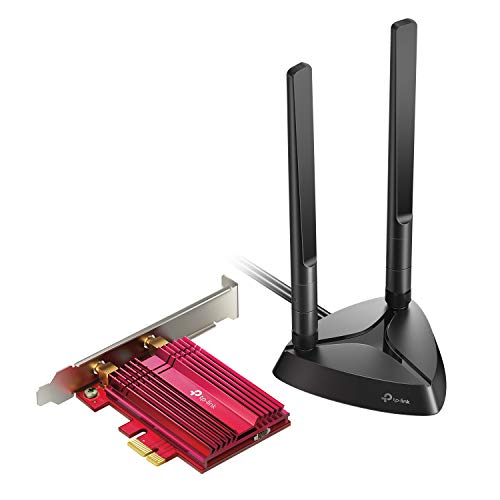 | TP-Link Archer TX3000E PCIe WiFi Card | Editor's Choice | Check Price |
| 2 | 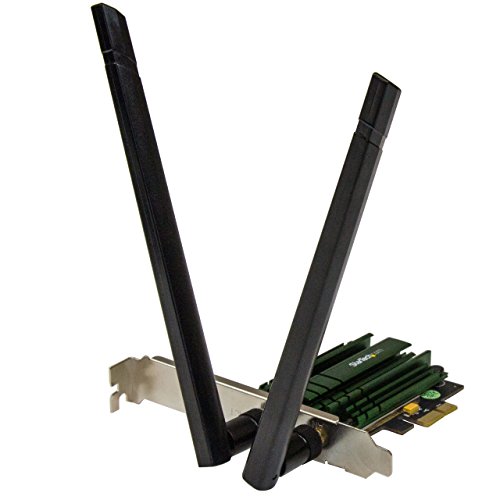 | StarTech PCIe Express AC1200 Network Adapter | Best Value | Check Price |
| 3 | 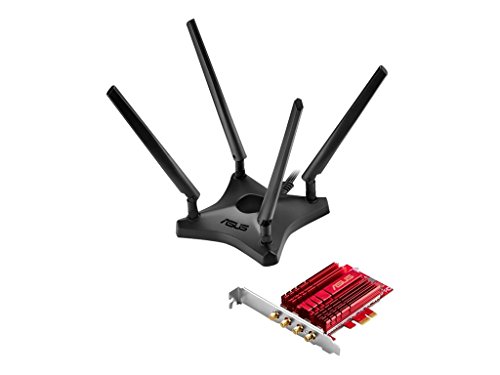 | Asus PCE-AC88 AC3100 WiFi Adapter | Best for Gaming | Check Price |
| 4 | 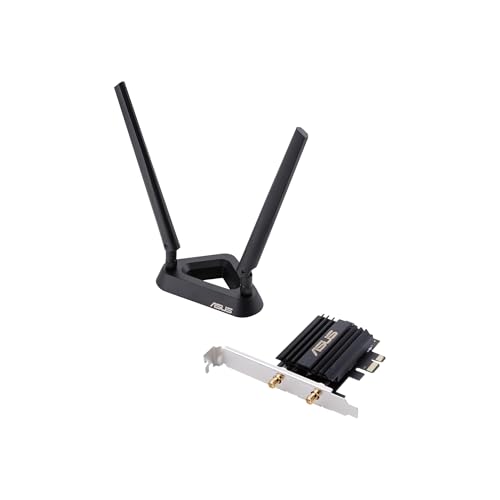 | Asus AX3000 (Pce-AX58B) PCIe Wireless Adapter | Super Low-Profile | Check Price |
| 5 | 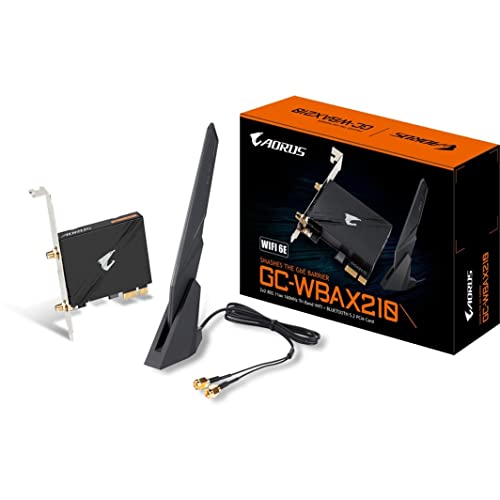 | GIGABYTE WiFi 6E GC-WBAX210 Expansion Card | Best WiFi 6E Card | Check Price |
| 6 | 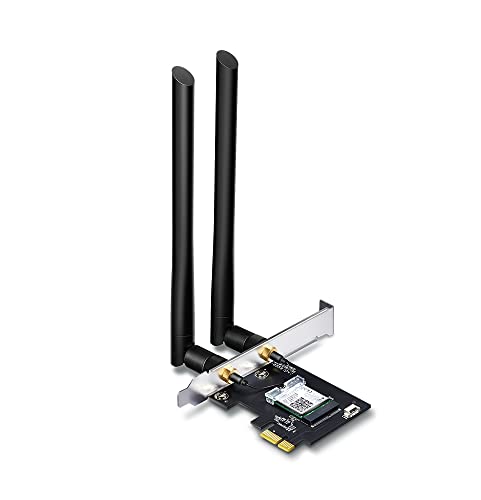 | TP-Link Archer T5E AC1200 WiFi Card | Entry-Level Pick | Check Price |
| 7 | 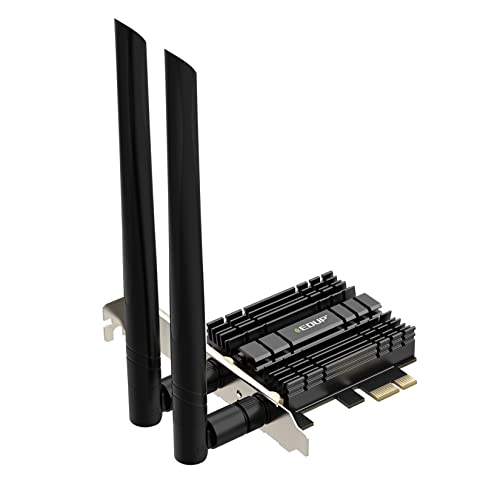 | EDUP PCI-E WiFi 6 Network Card | Best for Linux | Check Price |
| # | 1 |
| Preview |  |
| Name | TP-Link Archer TX3000E PCIe WiFi Card |
| Award | Editor's Choice |
| Details | Check Price |
| # | 2 |
| Preview |  |
| Name | StarTech PCIe Express AC1200 Network Adapter |
| Award | Best Value |
| Details | Check Price |
| # | 3 |
| Preview |  |
| Name | Asus PCE-AC88 AC3100 WiFi Adapter |
| Award | Best for Gaming |
| Details | Check Price |
| # | 4 |
| Preview |  |
| Name | Asus AX3000 (Pce-AX58B) PCIe Wireless Adapter |
| Award | Super Low-Profile |
| Details | Check Price |
| # | 5 |
| Preview |  |
| Name | GIGABYTE WiFi 6E GC-WBAX210 Expansion Card |
| Award | Best WiFi 6E Card |
| Details | Check Price |
| # | 6 |
| Preview |  |
| Name | TP-Link Archer T5E AC1200 WiFi Card |
| Award | Entry-Level Pick |
| Details | Check Price |
| # | 7 |
| Preview |  |
| Name | EDUP PCI-E WiFi 6 Network Card |
| Award | Best for Linux |
| Details | Check Price |
Last Update on 2024-10-27 at 21:28 / Affiliate links / Images from Amazon Product Advertising API
How We Picked and Tested WiFi Cards for PC
Picking some of the Best WiFi Cards for PC for this roundup was a bit of a challenge. It’s not really as simple as choosing the latest Cards from each company. For the purpose of choosing the best solutions available, our team of hardware specialists established a rigorous screening procedure.
Every WiFi card will perform differently in regard to transmission speeds, range, and connection reliability. With the conclusion of this list, hopefully, you are buying the best products.
Our first priority was, of course, the bandwidth of the card. Generally, most PCIe WiFi cards are bound to supply you with a connection speed between 300MBps to 2GBps. The most advanced WiFi cards (with Wifi 6 technology) pledge you to deliver over 2 Gbps of speed.
Secondly, we primarily selected the WiFi cards for PC that operated on WiFi 6 connection technology. However, there are a few on the list which lacks this feature. WiFi 6 assures that there are no unneeded bottlenecks or slowdowns on your computer and offers a superb overall wireless experience.
After the WiFi 6 technology, we examined the Futureproof and Longevity of the WiFi Card. It’s crucial that your WiFi card plays nicely with other facets of your wireless ecosystem. Even though wireless technology is evolving with the years, you want to take every step possible to ensure that your investment endures for as long as you can.
Lastly, Price-to-value is one of the most crucial considerations when choosing the best WiFi card. A reliable wireless card is available in almost any price range. Choosing the priciest solutions doesn’t necessarily imply that they are the greatest. We guarantee the WiFi network cards on our list have sufficient value to justify the cost that they demand.
We’ve only selected products in our list that we feel present the best value and performance for our readers. If you are planning to buy a WiFi card from the list, make sure you consider various factors like speed, range, connectivity, size, number of antennas, and best price to value if you are on a tight budget. Some WiFi Cards in our roundup also include Bluetooth so if you desire one you can look up to it.
Handy Peripherals: Best HDMI RF Modulators
Why You Should Trust Us
Searching for the best WiFi card among the dozens of options available is no easy task. However, at Appuals, we like to lend a helping hand to our readers. A WiFi card certainly isn’t something overly exciting, but for those struggling with a poor connection, it is crucial that they buy the right product.
One of our leading hardware writers, Asad Khan, boasts an extraordinary experience in building, troubleshooting, and improving the overall user experience on Windows PCs. He’s a bit of a stickler for performance, and only recommends products to our readers that he would use. This ensures that everything he reviews is held to the utmost scrutiny.
Led by Asad’s expertise, our team of highly specialized hardware experts puts every peripheral and component through a rigorous and thorough testing process. For this guide on the best WiFi card for PC, we measured everything including speed, range, value, latency, and overall reliability. So, whether you’re looking for something that suits your gaming needs, or just want a cheap solution to having good WiFi, we’ve got you covered.
Starting up our list of the Best WiFi Cards with the TP-Link Archer TX3000E. TP-Link has been ahead of the curve with its hardware for home and office network solutions. This Wi-Fi card features dual-band WiFi, meaning you get two channels on 2.4 and 5 GHz, respectively. You get a maximum speed of up to 2400 Mbps on the 5 GHz band and 574 Mbps on the 2.6 GHz band. Of course, real world speeds will tend to fluctuate depending on your ISP.
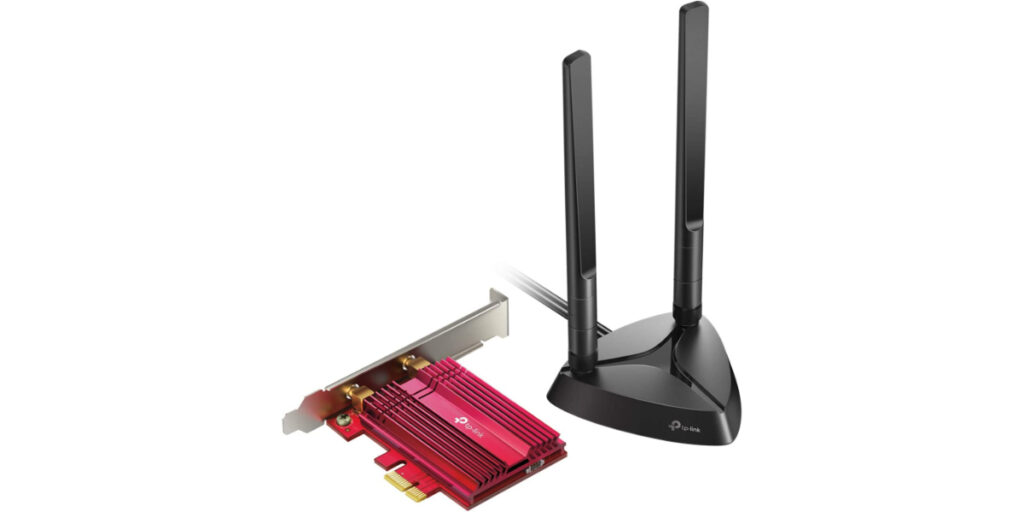
It’s good to see that this WiFi card supports the WiFi 6 standard. It’s a great upgrade over motherboards that might use an older standard. Speaking of which our best z690 motherboards roundup includes motherboards that have both WiFi 6 and WiFi 6E.
So, the Archer AX3000 also features OFDMA and MU-MIMO. These are features that are included with WiFi devices, and they allow more devices to communicate with your router on separate channels. This ensures that you get an efficient connection while reducing lag and allowing more devices to communicate simultaneously. This makes it a fantastic WiFi Card for your PC if you are into gaming and productive work.
As for the antennas, Archer AX3000 has two multi-directional antennas. These are high-performance antennas are designed with a magnetized bottom allowing you to place them in a suitable place so that you can get a rock-solid connection.
Having integrated Bluetooth 5.0 support is just the icing on the cake. Now you can connect all your favorite devices like controllers, headphones, wireless keyboards, etc without needing any additional Bluetooth adapters on your PC.
Related Read: Mesh WiFi Router vs Your Traditional Router
In terms of performance, this Wi-Fi card is quite impressive, as is expected from TP-Link. The connection never drops off, the latency is negligible, and the overall stability is quite good. Not much more you could ask for from a WiFi card from this reputable brand.
There’s not much else to say here. The Archer AX3000 is competitively priced, delivers exceptional performance, and most importantly, is easy to install and setup. Simply put, it does not get much better when it comes to WiFi cards for PC.
Next up on our list is the Startech AC1200. This is one of the smaller and more compact WiFi cards on this list. However, don’t let the size fool you. With web applications like streaming or uploading high-quality videos, online conferencing, and file transfers becoming more demanding, this WiFi-AC adapter delivers excellent speed.
Some might consider it a downside that it fitted with WiFi 5 instead of WiFi 6, but considering the average home in the US is around 50Mbps, a WiFi 5 PCIe card will still be more than enough for most users. Just make sure you find this one at a good price. At the time of writing, this one was priced under $70, and that’s what we recommend paying.
Worth the Read: Devolo WiFi 6 Repeater 5400 Review
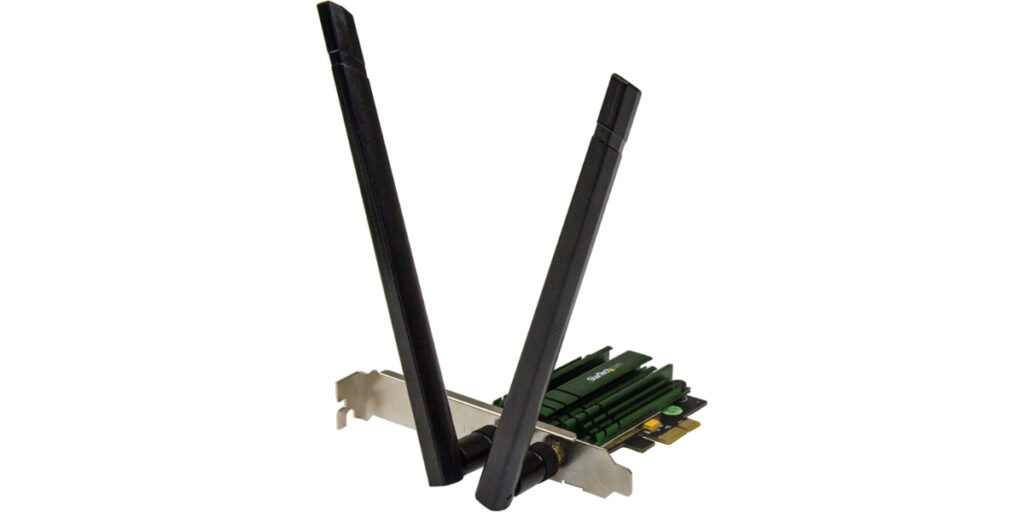
So, the controller card is fitted with a typical profile bracket and retains a low-profile/half-height bracket. This allows you to easily install the WiFi card into any small form factor PC. It’s a great choice for microATX cases and ITX cases alike.
Furthermore, while this PCIe card might be light on features, it does feature dual-band Wi-Fi. You can configure the card to use the 5GHz channel on your PC and use the 2.4GHz channel for other devices. Of course, you will also need a router that supports the dual-band design to take advantage of this feature.
Apart from that, this WiFi card is compact, reliable, and the installation is a breeze for any PC. While enthusiasts might feel like it lacks a bit in terms of features, it is more than enough for 99% of our readers. Of course, if you need something more high-end, keep on reading.
Third, on our list is the ASUS PCE-AC88 AC3100. This WiFi card is everything you have been waiting for if you want top-tier performance to match your new high-performance router. It has a robust design that delivers high availability, scalability, maximum flexibility, and price-to-performance ratio making it ideal for gamers out there.
The ASUS PCE-AC88 is a dual-band AC3100 4×4 Wi-Fi card built for desktop gaming PCs. Unlike the previously mentioned TP-Link archer AX3000 WiFi card, this doesn’t include the WiFi 6 support. However, This dual-band WiFi card offers a maximum speed of up to 2100 Mbps on the 5 GHz band and up to 1000 Mbps on the 2 GHz band.
Related Review: Devolo Magic 2 WiFi Next Review
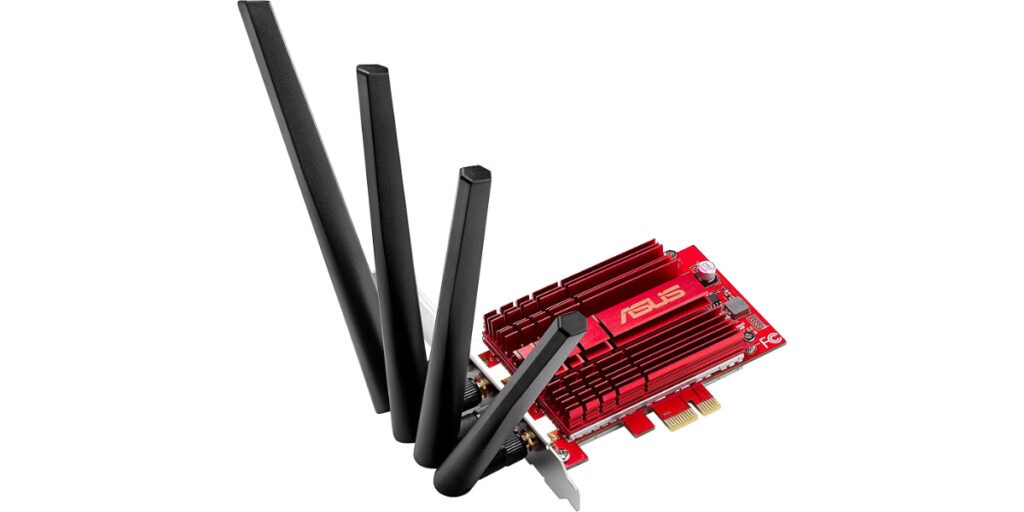
It has a quad antenna (4 transmitters, 4 receivers) design along with AI Radar beamforming support. Not only that but it also features MU-MIMO technology that allows more devices to connect at the same time. You can set and place the antennas on the magnetized base and adjust its position for best signal reception. Individual antennas can also be attached directly to the PCIe WiFi Card for a compact setup.
In addition, ASUS has also configured a customized heatsink design for improved stability and reliability so don’t fret about performing any bandwidth-intensive task like all-night gaming or streaming. Moreover, it also gives the system some extra style over a bare-looking PCB. This card can easily handle all heavy-duty workloads without losing any performance of the WiFi card.
If you are looking for a WiFi card that can handle heavy gaming or streaming sessions or uploading High-Quality videos, etc then this card would be a fantastic addition to your rig. Despite all the features, both the heatsink and four antenna mounts. It comes with an included SFF bracket that will make it compatible with those smaller systems too. Overall, the ASUS PCE-A88 AC3100 is the best gaming WiFi Card you can buy.
Coming up next on our list is the ASUS AX3000. The AX58BT is a fantastic upgrade for any PC user who wants a fast-speed internet connection without any connectivity issues. ASUS has been a boss in customer networking platforms for the last few years and driving into Wi-Fi 6, they plan to thrust that further. This WiFi Card is a small and good-looking network card that gets plugged into the PCI-Express port of your PC.
Helpful Guide: How To Set Up Your Mesh WiFi Network
The AX58BT is the next evolution of the ASUS PCIe AIC lineup. This WiFi Card features a 2×2 radio offering a maximum speed of 2400 Mbps for the 5 GHz band and up to 600 Mbps for the 2.4 GHz band. It fully supports Wi-Fi 6 (802.11ax) standard and WPA3 Security standard to secure the user from malware and hackers, 160MHz channels and is powered by the Intel AX200 chipset.
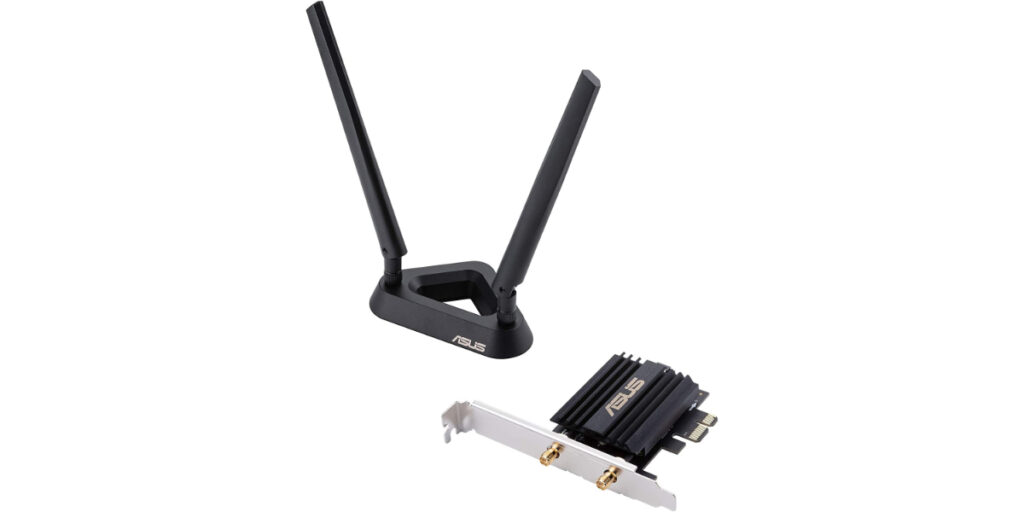
On top of that, It also includes Bluetooth 5.0, capable of allowing the connections of multiple devices such as wireless keyboard, mouse, controller, etc simultaneously without the need for an external Bluetooth device.
The card also includes the OFDMA and MU-MIMO feature, allowing it to achieve maximum Wi-Fi speed, even when numerous other devices are connected to the network simultaneously. Instead of alternating data transfer to the router, MU-MIMO allows multiple devices to transfer data simultaneously without waiting for.
The ASUS AX3000 has exceptional build quality as expected from ASUS. It is designed compactly with a large heatsink that wraps almost the whole card which delivers stability and longevity. It also includes 2 external antennas which can be attached to the base and can also be adjusted according to the user to provide the best signal reception making it flawless for daily office use or gaming
Next up on our list is the Gigabyte WiFi 6E. Gigabyte is well known for designing quality PC products in the custom desktop space, including PCIe Wi-Fi cards. Among their catalog of Wi-Fi cards, the GC-WBAX210 managed to make a place for itself in the list of our Best WiFi Cards for PC.
The Gigabyte Wi-Fi 6E GC-WBAX210 is a PCIe WiFi expansion card shipped with an Intel AX210 Wi-Fi 6E chip which delivers fast wireless speeds. The new technology in this card is able to use the 6GHz band for more interference-free signals. While this card comes with an acceptable price, it’s definitely robust enough to offer outstanding performance.
Informative Read: Mesh WiFi Routers Buying Guide
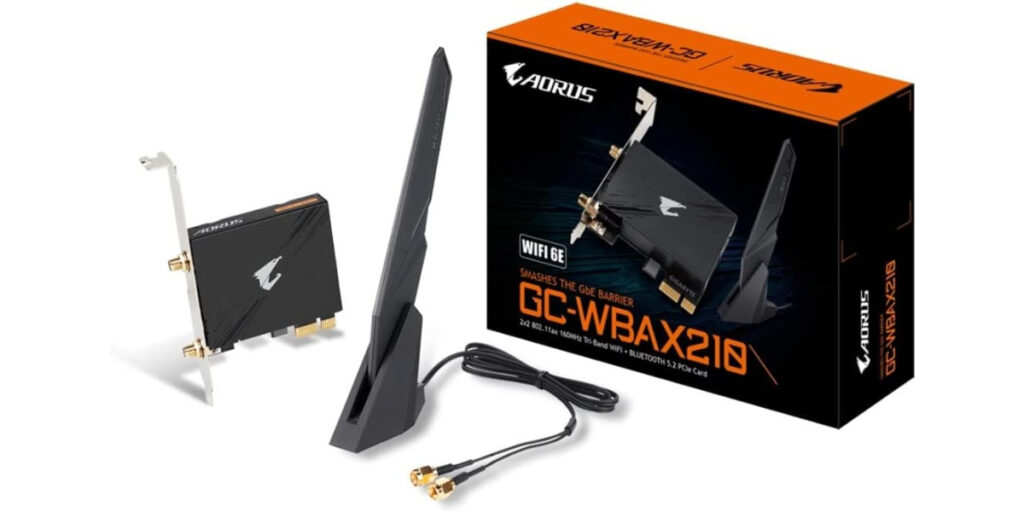
Talking about the bandwidth, this card supports dual-stream Wireless in the 2.4GHz, 5GHz, and 6GHz bands to provide a magnificent internet experience at a High-speed of up to 2400 Mbps with 1024 QAM and 160MHz channels. The Gigabyte WiFi 6E is an exclusive PCIe card that offers support for the latest 2×2 802.11ax 160mhz Tri-Band WiFi for users to enjoy intensive internet applications and all-night gaming or streaming HQ Videos.
Moreover, It comes with WPA3 Security to prevent malware and hackers and also features MU-MIMO technology allowing multiple devices to connect and transfer data at a significantly high speed. It features Bluetooth 5.2 compatibility which allows connecting various wireless devices such as speakers, mice, keyboards, etc without worrying about an extra Bluetooth dongle.
This card also has the AORUS branding with a nice heatsink plate surrounding the AX210 chip itself on the board and also includes an AORUS antenna with a smart antenna function for the best WiFi signal transmission. It can be tilted to multiple angles and can be attached to the magnetic base for the finest signal strength direction and location. So if you need the absolute best WiFi card and have the router to fit then it’s a pleasing choice.
Next up on our list is the TP-Link AC1200 Archer T5E. This WiFi card is the best-selling PCIe WiFi card on our list because of its high speed in contrast to its relatively cheap price. The Archer T5E is a compact, budget-friendly, dual-band WiFi Card and also supports a wide range of wireless devices. If you are a fan of wireless gaming but you are on a tight budget, this is the card you should go for.
Necessary Read: How To Connect To 5GHz WiFi
Regarding bandwidth allocation, this card offers a maximum speed of up to 867Mpbs for the 5 GHz band and up to 300 Mbps for the 2.4 GHz band. Archer T5E also features an 802.11ac dual-band WiFi PCI Express adapter, providing WiFi signals on two individual bands for all your online needs. Choose the 2.4 GHz band for surfing, emailing, and social media, or switch to the 5 GHz band for gaming, streaming, and large file downloading or uploading.
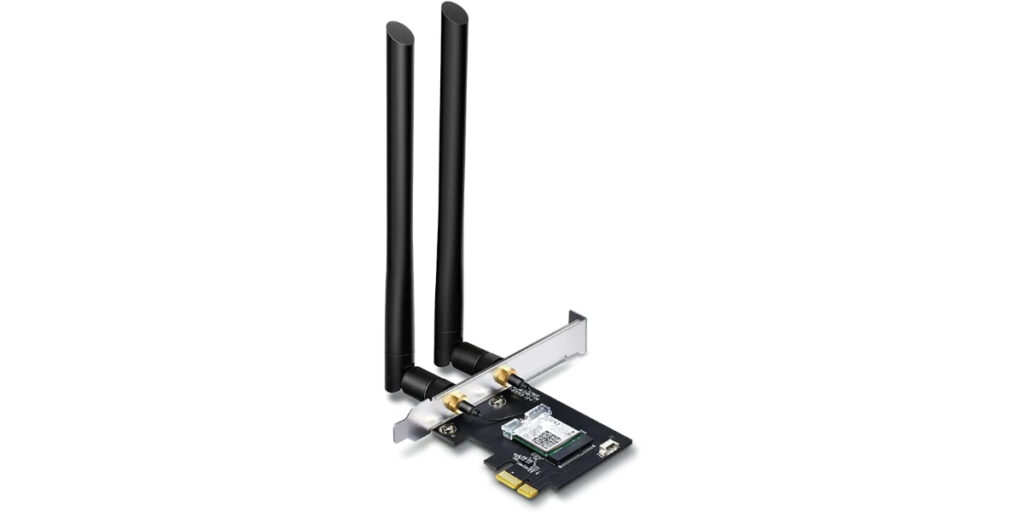
However, this WiFi card doesn’t feature the latest WiFi 6 technology which is quite disappointing but considering the price point and other amazing features, it is a great deal.
Archer T5E is compatible with advanced Bluetooth 4.2 technology, achieving 2.5× faster speed and 10× more packet capacity than Bluetooth 4.0 to turn non-Bluetooth PCs into Bluetooth-Capable. Just pair your Bluetooth devices to your PC and enjoy.
The card also comes with a decent security solution with WPA and WPA2 encryption standards. The TP-Link Archer T5E is one of the best-value high-speed Wi-Fi cards that you can buy. Incidentally, you should also learn the differences between WEP, WPA, and WPA2 security.
This PCI-Express card can be plugged into a variety of computers. It is compatible with Windows 10, 8.1, 8, and 7. This Wi-Fi card is easy to install and delivers a better range. It comes with 2 undetachable antennas which can be attached to the WiFi card to provide better signal reception.
To sum it up, TP-Link Archer T5E is a solid product that you can fit in almost any PC, thanks to its super compact design and low-profile bracket everything at a surprisingly low price.
Last but not least on our list is the Edup AX1800. This WiFi card utilizes WiFi 6 technology, Bluetooth 5.2 support, and offers exceptionally fast transfer speed at a reasonable price. It leads to remarkable network experience in terms of stability, reliability, and range. The Edup WiFi 6-enabled adapter supports all high-end functions such as 4K video streaming or high-demanding online game
The Edup AX 1800 comes with a Built-in Intel AX210 chipset which provides the latest 802.11ax standard technology. Target Wake Time, delivers from 80MHz to 160MHz higher peak data rates up to 2.4Gbps, and up to 4X capacity improvement in dense or congested environments compared to 802.11ac. This card delivers an impressive speed of up to 1200 Mbps on 5.8 GHz and 600 Mbps on 2.4 GHz.
Helpful Read: Difference Between Router And Modem
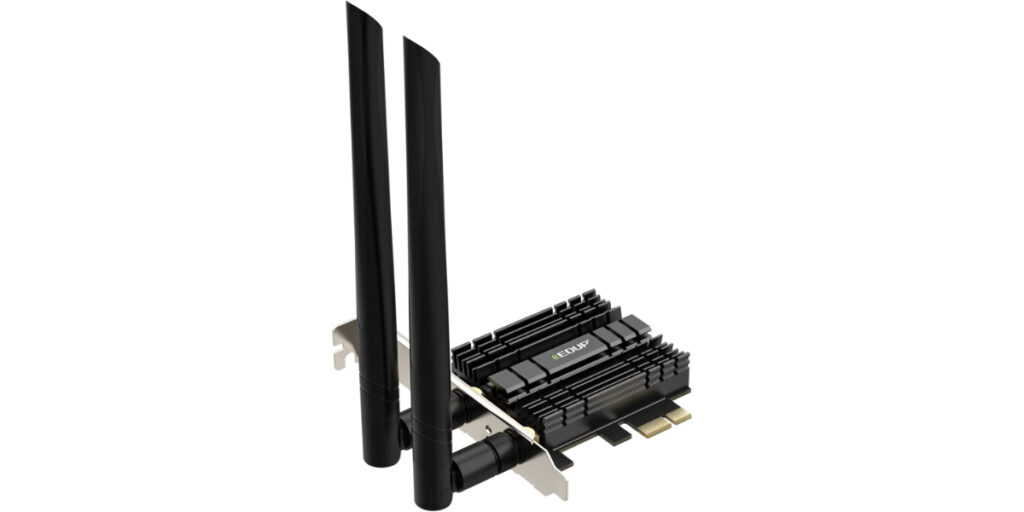
This PCIe WiFi card features Bluetooth 5.2 technology which offers 4x Range over Bluetooth 4.2, and 2 x Transmit Speed for faster transmissions thereby reducing the overall power and allowing you to connect all your favorite devices such as the controller, wireless keyboard and mouse, speakers, etc.
This card features the MU-MIMO technology which immensely enhances the network quality, and the Internet speed is improved compared to typical AC WiFi cards. It also includes 2 external antennas which can be connected to the WiFi card and adjusted to provide adequate signal reception and also a compact setup.
The Edup WiFi 6 card supports Windows 10/11 64-bit OS. Compatible with all PCIe standards. Standard and Low-Profile Brackets to adjust to your different PC cases. However, it doesn’t support any other OS, even the older windows versions such as Windows 8.1, 8, 7, and onwards.
This feature-packed device is a mouth-watering prospect for every gamer or high-end graphics user who is looking for a budget-friendly WiFi Card for their PCs.
Do I Need a WiFi Card for My PC?
Yes, you surely need a WiFi Card for your PC if your router is far away and your motherboard doesn’t have built-in WiFi and you want to enjoy high-speed internet without worrying about connectivity issues. WiFi Cards tick all the right boxes since it performs well, are easy to use, and fit in almost any PC Case. Their performance is marginally better than the USB WiFi dongles as they have an onboard heatsink, and external antennas which provide a better overall experience and also a fantastic internet quality.
On the other hand, If we talk about the Ethernet cable, then the Ethernet Cable is more reliable and stable than the WiFi card. WiFi introduces ping variance that’s why it is less desirable for gaming compared to cable. Ethernet cables instantly transfer data via light signals. Besides, the WiFi transmits data using radio waves which can be sometimes susceptible to distortion and congestion.
But keeping the above-mentioned issues in mind, a PCIe Wireless card would get the job done.
What is the Fastest WiFi Card?
The fastest PCIe WiFi Card is the TP-Link Archer TXE72E providing a peak bandwidth speed of up to 5,378 Mbps. It features WiFi 6 technology which is the most recent WiFi network protocol and is a substantial upgrade over its predecessor. It comes with the latest Intel WiFi 6E chipset providing a more stable and reliable wireless connection. Moreover, it also includes Bluetooth 5.2 which helps in connecting all your wireless devices without any USB Bluetooth dongle, and the WPA3 Security standards to better secure personal, and enterprise networks.
Things You Should Know About WiFi Cards
WiFi cards for PC tend to be pretty simple, however, there are certain confusing terms that most people will not be familiar with. Throughout this guide, you might have run into technical jargon such as MU-MIMO, OFDMA, Dual-band WiFi and the like. Knowing about these features (and what they do), can help you make a better buying decision.
Here are some things to know about WiFi cards before buying for your PC.
Wi-Fi Standard
Whenever you go out to buy a new router, WiFi card, motherboard, or anything that is related to your network connection, you’ll run into Wi-Fi standards. Of course, terms such as “802.11ax WiFi” might sound like jargon to most readers. Here’s a quick summary on WiFi standards.
So, the number first three digits in “802.11ax” represent computer networks, and the “.11” part stands for WLAN or WiFi. The digits “802.11” are followed by letters such as “ac” or “ax”. For example, 802.11ac WiFi or 802.11ax WiFI. These letters represent the speed and WiFi protocol.
WiFi 5 is also known as 802.11ac WiFi, while Wi-Fi 6 is 802.11ax. Of course, WiFi 6 is faster, more reliable, and has tighter security. Most new devices that are capable of a WiFi connection will feature support for it.
Does that mean WiFi 5 is bad? Not at all. WiFi 5 is still fast enough for most people, it’s just that WiFi 6 has better security and allows more devices to connect simultaneously. While a PCIe card that uses WiFI 5 will be enough for most people, we recommend hunting for WiFi 6 if you’re buying a new card today.
Range
Range is not something you need to worry about explicitly. However, this does depend entirely on where you place your PC. If your phone can easily pick up WiFi in the room where your PC is, then you don’t need to worry too much about range.
On the other hand, if your PC is placed considerably further away from your router, that’s where you will start to run into problems. In that case, it’s better to look out for a router with a wider range.
OFDMA and MU-MIMO
Continuing with the on-going theme of WiFi 6, let’s talk a bit about OFDMA and MU-MIMO. OFDMA is a new feature that was introduced with Wi-Fi 6. It allows multiple devices to communicate with your router, meaning a WiFi 6 router can allow data travel to different devices from just one transmission.
On the other hand, MU-MIMO, or Multi-user, multiple input/output, will allow WiFI 6 routers and other devices to communicate with each other. The official spec tells us that you can connect up to 8 devices at the same time. While you could already do this on previous WiFi standards, MU-MIMO ensures that the speed remains same throughout all of your devices.
So, don’t just fall into the marketing gimmicks with these terms. While they are great features, all WiFi 6 devices have them, and you shouldn’t buy a device just because it says it has “OFDMA” support on the product page.
Bluetooth Versions
Buying a WiFi card for your PC is like hitting two birds with one stone. This is because all WiFi cards will also add Bluetooth support to your system. WiFi 5 cards feature support for Bluetooth 5.0, while WiFi adds support for Bluetooth 5.1 and later. Finally, WiFi 6E card add support for Bluetooth 5.3, but those are few and far between right now.
Buyer’s Guide for WiFi Cards
Apart from the standards and features we talked about above, there are additional things to look out for when buying a WiFi card. So, before you go out and spend money on any device, take a look at this buyer’s guide to figure out what you need out of a WiFi card.
OS Compatibility
Of course, before you go out and buy a WiFi card, you need to make sure it is compatible with your operating system. However, if you are on a Windows PC and are running Windows 10 or later, then you don’t need to worry about this.
On the other hand, if you are a Linux user, then OS compatibility is something to take into mind. Linux distros can be notorious for not working properly with WiFi or Bluetooth devices. So, look out for any mention of Linux support in the product page of the WiFi card you are planning to buy.
Size
Most PCIe WiFi cards will fit into your motherboard’s PCIe x1 or x16 slot. So, in this case, you don’t really need to worry about size. This is especially true considering most cards will use the x1 slot rather than the x16. As such, it is highly likely that you have an empty x1 slot on your motherboard. Since WiFi cards are so tiny, installation is easy as well.
However, take into account that installation won’t be as easy on pre-built PCs or ITX cases. You’ll have a hard time accessing the motherboard in those cases. So, make sure you get a WiFi card that is compact in size, but also easy to install or remove.
Antennas
Moving on, you’ll notice that most of the WiFi cards on this list have two or more antennas. As you can imagine, having more antennas on a device is usually good for signal strength. Sure, while that’s true to an extent, the internal configuration of the WiFi card also matters a lot. The controller on the WiFi card that is responsible for your wireless connection needs to be good as well. However, as a general rule of thumb, two or three antennas on a PCIe WiFi card is always a good thing.
Budget
Next up, we can’t forget about budget. However, this discussion is entirely situational. Do you need a stron Wi-Fi connection to transfer files over your network? Or do you just need something that provides you with a wireless connection so you can stream video? In both situations, you need a wireless connection, but the use case is different. This is what will dictate your budget.
You can go out and buy an expensive WiFi 6E card that performs well, but if your internet connection or workflow can’t take advantage of that speed, then it is sort of a waste of money. So, make sure you’re buying something that you’re actually going to use for a considerable period. Fortunately, WiFi cards aren’t all that expensive either way, so some people might not worry too much about budget in the first place.
Best WiFi Cards for PC - Frequently Asked Questions
While you could use any WiFi card to get a wireless connection, it does matter what card you get for your PC. You want to look out for speeds, Wi-Fi standard, external antennas, and more.
WiFi cards will typically fit into the PCIe x1 slot on your motherboard, so that slot is the best for your WiFi card.
While WiFi adapters can technically increase internet speeds, it also depends on what type of connection you have and how far away your router is from your PC.
To stream 4K video, you need at least a 25Mbps connection. Fortunately, most WiFi adapters are well above that.
Yes, the quality of a WiFi card does matter as that can dicatate your internet speed at the end of the day.
 Check Price
Check Price